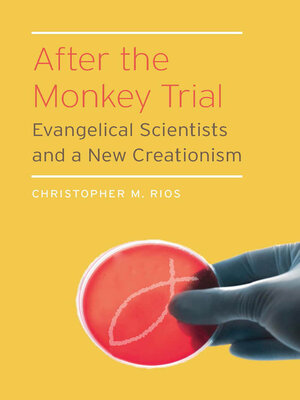
Sign up to save your library
With an OverDrive account, you can save your favorite libraries for at-a-glance information about availability. Find out more about OverDrive accounts.
Find this title in Libby, the library reading app by OverDrive.



Search for a digital library with this title
Title found at these libraries:
| Library Name | Distance |
|---|---|
| Loading... |
This study sheds light on the work of the evangelical scientists who sought to bridge the cultural divide Christianity and evolutionary theory.
In the well-known Scopes "Monkey Trial" of 1925, famously portrayed in the film and play Inherit the Wind, William Jennings Bryan's clashed with defense attorney Clarence Darrow. The drama, pitting fundamentalist fervor against aggressive agnosticism, illustrated what current scholars call the conflict thesis. Regardless of the actual legal question of the trial, it appeared as though Christianity and science were at war with each other.
Decades later, a new generation of evangelical scientists struggled to restore peace. After the Monkey Trial is the compelling history of those evangelical scientists in Britain and America who, unlike their fundamentalist cousins, supported mainstream scientific conclusions of the world and resisted the anti-science impulses of the era.
Christopher M. Rios focuses on two organizations, the American Scientific Affiliation and the Research Scientists' Christian Fellowship (today Christians in Science), who for more than six decades have worked to reshape evangelical engagement with science and redefine what it means to be a creationist.
In the well-known Scopes "Monkey Trial" of 1925, famously portrayed in the film and play Inherit the Wind, William Jennings Bryan's clashed with defense attorney Clarence Darrow. The drama, pitting fundamentalist fervor against aggressive agnosticism, illustrated what current scholars call the conflict thesis. Regardless of the actual legal question of the trial, it appeared as though Christianity and science were at war with each other.
Decades later, a new generation of evangelical scientists struggled to restore peace. After the Monkey Trial is the compelling history of those evangelical scientists in Britain and America who, unlike their fundamentalist cousins, supported mainstream scientific conclusions of the world and resisted the anti-science impulses of the era.
Christopher M. Rios focuses on two organizations, the American Scientific Affiliation and the Research Scientists' Christian Fellowship (today Christians in Science), who for more than six decades have worked to reshape evangelical engagement with science and redefine what it means to be a creationist.







